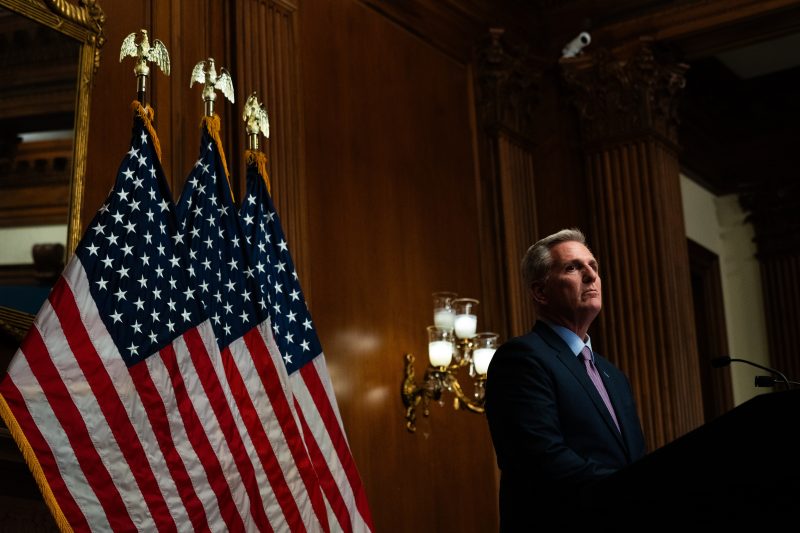The frustration that Rep. Kevin McCarthy (R-Calif.) had been trying to keep hidden for months (with varying degrees of success) seeped out on Tuesday evening. At a news conference following his ouster as House speaker, McCarthy attacked those responsible for the defeat, particularly Rep. Matt Gaetz (R-Fla.), who had called for the vote in the first place.
McCarthy also offered more than a little bile to another longtime foe: his political opposition.
“I think today was a political decision by the Democrats,” McCarthy said. “I think the things they have done in the past hurt the institution,” he said, pointing, as an example, to the removal of Rep. Marjorie Taylor Greene (R-Ga.) from committees in the last Congress.
Speaking of the eight Republicans who voted to oust him, McCarthy said: “My fear is the institution fell today, because you can’t do the job if eight people — you have 94 percent or 96 percent of your entire conference, but eight people can partner with the whole other side. How do you govern?”
He claimed that the former speaker, Rep. Nancy Pelosi (D-Calif.), had promised to stand with him should a motion to vacate the speakership come to a vote. Pelosi wasn’t one of the Democrats who voted to remove him from office — but she didn’t vote at all as she was in California following the death of Sen. Dianne Feinstein.
This argument from McCarthy got some traction in the immediate aftermath of his ouster. Why wouldn’t Democrats side with the institution and defend the Republican speaker? Weren’t they the ones who liked to preen about being the defenders of democracy and good governance?
But this invites an obvious response: Why, particularly for the past decade or so, has it consistently been up to Democrats to be the line of defense?
McCarthy’s ouster was due in part to his working across the aisle last week to pass legislation funding the government. Gaetz invoked McCarthy’s willingness to pass legislation with Democratic votes as a criticism earlier this week.
One should not labor under the misapprehension that this was common, however. In a letter to his colleagues, House Minority Leader Hakeem Jeffries (D-N.Y.) detailed occasions in which McCarthy had broken agreements or refused consensus. (He also reminded Democrats that Gaetz’s ability to seek McCarthy’s ouster followed a rules change to which McCarthy had agreed.)
Even when it came to Tuesday’s question on whether he should get to serve as speaker McCarthy told his caucus in private and said publicly in an interview on CNBC that he wasn’t going to reach a compromise with Democrats. There was just the expectation — or McCarthy would later claim such an expectation — that the Democrats would side not with him but with tradition and stability. Democrats didn’t call for McCarthy’s removal, but they didn’t keep it from happening, either.
From a practical standpoint, it’s useful to consider the calculus for the minority.
Republicans have a nine-member advantage, something that consistently frustrated McCarthy’s efforts to get things done — particularly given his party’s ostentatious antipathy toward compromise. So issue after issue saw the right-wing fringe of his caucus demanding concessions and not infrequently receiving them. On issue after issue, McCarthy wouldn’t or couldn’t reach an agreement with Democrats.
Whoever replaces him will have similar constraints. Perhaps there were wins McCarthy attained that his successor wouldn’t. But there may be ones his successor can achieve — perhaps thanks to having arrived in power with a broader mandate from the caucus — that McCarthy couldn’t. Or perhaps Democrats might be forgiven for (probably naively!) thinking there could be a speaker who actually tries to build majority support from the whole House instead of just the Republican caucus. What’s the worst a new speaker could do, use falsehoods to launch an impeachment probe targeting President Biden?
Put another way, there is certainly a little room for the next speaker to be worse for Democrats. There is a lot of room for the next speaker to be better.
But now we come back to the bigger issue, the one that colors so much of national politics in the moment. McCarthy watched as the Republican Party shifted toward more and more overt rejections of the institutions of governance. At times, he leveraged that shift. At other times, he stood by tacitly.
For example, there is probably no other Republican who demonstrated the same combination of personal power and silent fealty to Donald Trump. Trump is the embodiment of demands for the dismantling of political norms and power structures, someone whose rise on the right was predicated on his indifference to building consensus or respecting how Congress (or anything else in government) usually worked.
McCarthy’s party gave Trump and his supporters space — and encouragement — to shred Washington and to undercut the functions of democracy. McCarthy voted to reject the electors submitted by states that Biden won in 2020, even after the Capitol riot — even after Trump insulted him in a phone call. He privately suggested that Trump should leave office after the riot but then succumbed to pressure from his caucus and the Republican base. Instead of impeaching Trump, he asked for a probe. When a probe was later put forward he opposed it, because that’s what the base wanted.
He wasn’t alone. The party has repeatedly — and at times obviously sincerely — framed concerns about Trump’s actions or the erosion of democratic values as overblown. It’s a point of contrast for them, framing Democrats as hyperventilating scolds using “democracy” in the way many on the right think they use “racism,” as a dishonest, morality-soaked cudgel.
Indexes of support for open, liberal democracy, though, show that the GOP has measurably shifted away from that ideal. McCarthy’s inability to lead his caucus is in part a function of his base simply rejecting leadership out of hand. Increasing the debt limit is now a partisan issue — as often is funding the government at all. The pressure against these things comes from the right. Keeping things running becomes the Democrats’ responsibility.
And make no mistake: The broad rejection by Republicans of D.C. as tainted, polluted — an idea that McCarthy certainly hasn’t done much to combat — is itself a hostility to government institutions. But it’s one that plays well with the GOP base and, for a long time, didn’t threaten McCarthy’s power.
On one day, on one issue, the Democrats didn’t step up to backstop institutional power: McCarthy’s. Perhaps his successor will make protecting America’s institutional power more of a priority — even though it would require pushing back on the Republican caucus and electoral base.



























